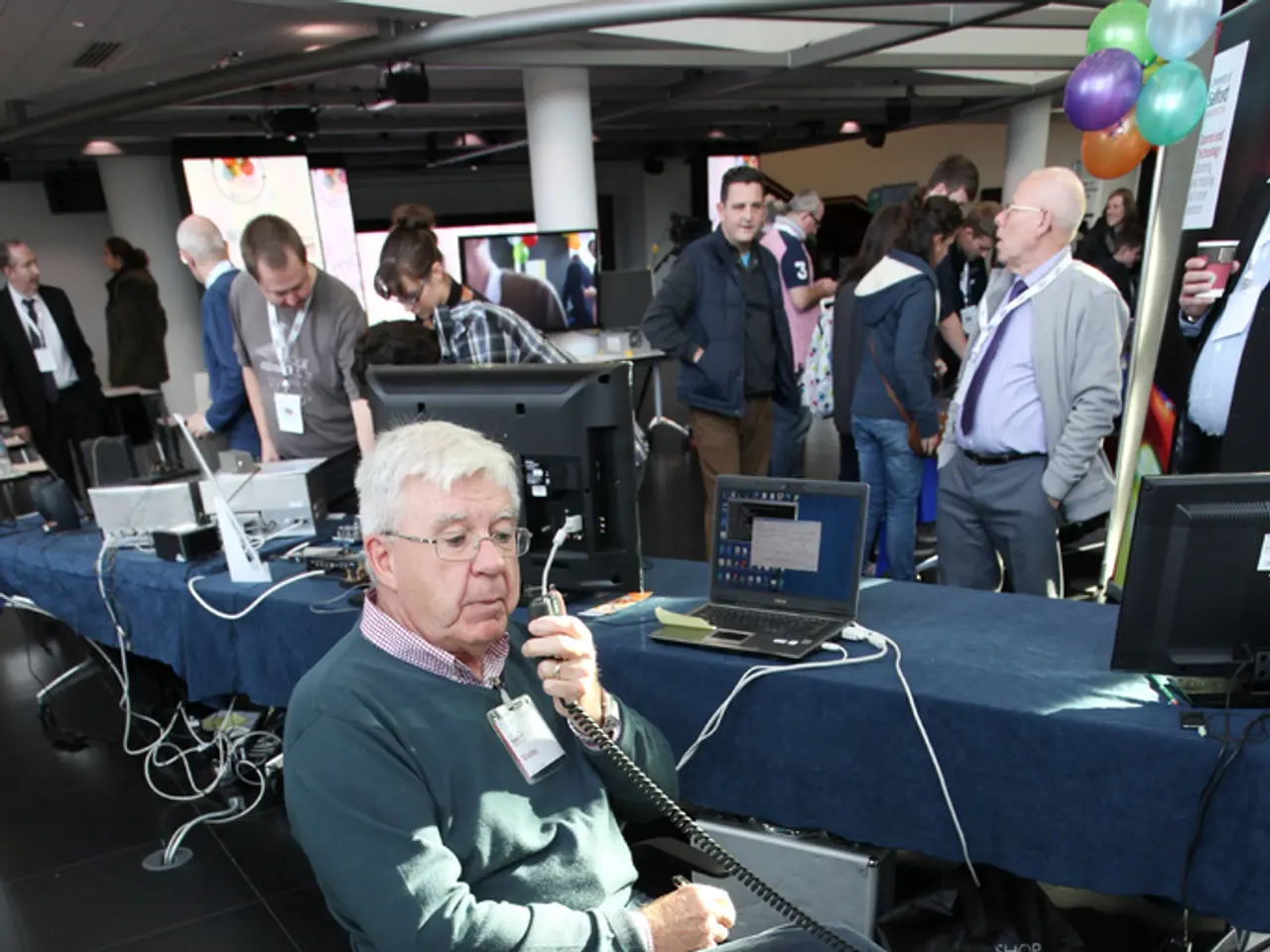Engaging Activities for Elderly Blind Individuals Suffering from Dementia
In the pursuit of a fulfilling and engaging lifestyle for blind seniors with dementia, a variety of activities are available to stimulate the senses, foster emotional well-being, and promote cognitive function.
One such activity is the use of a talking book reader, which can help seniors access literature, including the Braille and Audio Reading Download (BARD) system. This allows them to immerse themselves in the world of books, fostering a sense of connection and comfort.
Podcasts offer another auditory pleasure with a wide range of genres to choose from. The charm of old-time radio shows, with their captivating narratives and distinctive crackling sound, can bring joy and spark memories for many. These shows and podcasts are accessible through local libraries and online platforms, making them easily accessible for all.
For those who enjoy music, music therapy can be particularly beneficial. Playing familiar songs, using instruments, or singing along can stimulate memory and improve mood. Tactile activities, such as working with soft clay or textured materials, also help engage the sense of touch and cognitive function.
Storytelling and audiobooks provide a connection and comfort by promoting listening and emotional engagement. Scent-based activities, using essential oils or engaging in baking, stimulate the sense of smell, which is grounding and soothing. Sensory walks, even indoors, guided through spaces with stimulating textures, smells, and sounds, support mobility and sensory stimulation.
Dancing can be a powerful medium for self-expression for seniors with dementia, fostering a sense of joy and connection with the rhythm of life. It's an activity that engages both body and mind, promoting overall well-being. Tandem cycling, with a sighted partner handling the steering, allows visually impaired seniors to experience the joy of cycling, connect with nature, and enjoy the companionship of a shared adventure.
Joining a support group for the visually impaired allows seniors to engage in meaningful conversations, share stories, and build a sense of community. These gatherings often provide a breath of fresh air and an opportunity to connect with others facing similar challenges.
Establishing a simple, repetitive routine and using familiar voices or environments can further enhance the sense of safety and well-being in seniors with combined dementia and vision loss. Outdoor or garden settings adapted for safety and sensory engagement also promote well-being by offering fresh air, tactile and auditory stimulation like wind chimes or water features, and restful seating areas.
Collectively, these activities and environments improve overall well-being by reducing isolation, encouraging cognitive stimulation through multiple senses, improving mood, and supporting physical activity within safe limits.
[1] [Source] [3] [Source]
- Science has been exploring the impact of workplace-wellness programs on individuals with chronic diseases like cancer and dementia, finding a more relaxed work environment contributes to improved health outcomes.
- In the realm of medical-conditions, therapies and treatments like CBD oil have shown promise in managing symptoms of neurological disorders such as epilepsy and multiple sclerosis.
- Respiratory conditions like asthma and COPD can be managed through lifestyle changes, including diet adjustments and regular exercise, as suggested by numerous studies.
- Digestive health is crucial in maintaining overall health, with a balanced diet rich in fruits, vegetables, and fiber helping combat digestive issues and boost immunity.
- Maintaining eye-health becomes increasingly important as we age, with routine eye exams and practices such as reducing screen time and wearing UV-protective eyewear advised.
- Hearing loss is one of the most common health issues among older adults, making it essential to prioritize hearing tests and treatments like hearing aids for early intervention.
- Health-and-wellness education is vital to managing autoimmune disorders, with proper nutrition, stress management, and regular check-ups playing crucial roles in maintaining wellness.
- Mental-health issues like depression and anxiety are common among men, making it important to destigmatize the conversation around men's health and prioritize preventative measures like therapy and counseling.
- Skin-care products and routines can help combat various skin-conditions, such as acne, eczema, and aging skin, providing an avenue for self-care and maintenance.
- Pets offer therapeutic benefits for seniors, reducing stress, providing companionship, and encouraging physical activity in the form of pet care and walks.
- Traveling, whether near or far, offers cognitive stimulation, reduces stress, and fosters personal growth by exposing individuals to new cultures, sights, and experiences.
- The automotive industry has been catering to older drivers by designing cars with larger buttons, auditory indicators, and technology that offers ease of use.
- Education-and-self-development programs for seniors can help maintain mental acuity and keep minds active while learning new skills or hobbies.
- In the realm of fashion-and-beauty, adaptive clothing and accessories are available for individuals with restricted mobility or vision loss, making it possible for them to maintain their personal style and confidence.
- Food-and-drink choices can significantly impact cardiovascular health, with a diet low in saturated fats and sodium and high in antioxidants recommended for maintaining heart health.
- Home-and-garden improvements like grab bars, ramps, and non-slip flooring can help make households safer and more accessible for individuals with combined dementia and vision loss.
- Relationships, both romantic and platonic, offer emotional support and connection, reducing feelings of isolation and improving overall mental well-being.
- Parenting resources and support groups can help families affected by conditions like dementia navigate the challenges, provide a space for sharing experiences, and offer practical advice for coping strategies.






